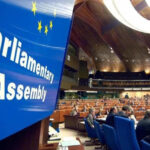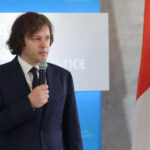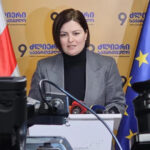The Counsellor for the EU Delegation in Georgia, Julien Crampes and the US Embassy’s political officers, Lana Owens, and Evan Elliott met with Alexander Elisashvili (Chair of the Political Group Citizens), David Usupashvili (Chair of the PG Lelo – Partnership for Georgia), Khatia Dekanoidze (Chair of the Faction Unified National Movement – Unified Opposition Unity Makes Strength), and Mikheil Daushvili
“We reviewed the progress of the 12 tasks that the EU set for Georgia to receive the so-called EU candidate status. We informed our guests about the intensive work in the working group, the involvement of the opposition in this project and paid particular attention to judicial reform. We told the diplomats we were the only party to present an alternative vision of the Georgian Dream regarding the judicial reform and stressed its importance”, Elisashvili said.
Usupashvili said, “speaking of the EU candidate status the officers of embassies expressed commitment to help us in this direction. They asked about de-polarization. I explained the position of Lelo and our intention to participate actively in the Committee sessions and plenary, but not the preparatory stages, working groups, etc. The positions will be reconciled in an open process during the Committee sessions, where we will submit our positions.”
“We discussed the implementation of the EU recommendations.” I explained that we are witnessing the active discussions in the Committees and during the sessions about the implementation of these 12 recommendations. Dekanoidze also noted that we discussed the political situation in Georgia and the foreign policy course.
First session of the Working Group on Deoligarchization
The first session of the Working Group on Deoligarchization, at the Legal Issues Committee, was held to discuss the Ukrainian Law on Deoligarchization. Anri Okhanashvili is the Chairman of the Committee as well as the Head of the Working Group. They aim to adapt Ukrainian Law to Georgian Compliance.
“The 12 points presented by the European Commission include de-oligarchization.” “Similar proposals were made for Moldova as well as Ukraine,” he added. “The European Commission has given Ukraine the instruction to put the de-oligarchization laws into practice. This shows that the EC is in favor of the passing of the de-oligarchization law and that it now needs to be implemented. We need an objective benchmark to determine if the de-oligarchization requirements are met. We will use the EC position on Ukraine as a benchmark and, in accordance with it, adopt a model that was demanded by the EC to be put into action. We want to avoid disputes over the document’s contents, because there is a high probability that this provision will not be deemed as satisfied in a situation like this due to the open-ended interpretations. Even though Ukrainian law isn’t perfect, it has set requirements for the implementation on certain issues,” Okhanashvili said, adding that “the working group intended modify this statute in order to eliminate all suppositions.”
We will draft the law first, before moving on to the political arena, committees, and plenary sessions. The Venice Commission may have reached a decision by this time regarding the Ukrainian model.
The working group was composed of representatives from the Georgian Dream faction and the parliamentary majority, as well representatives from the government administration, CEC and State Audit Service, National Communications Commission and Competition Agency. Two seats are reserved for civil society representatives (EaP Civil Society Forum).
The working group’s draft law should be introduced no later than 5 October, and the law should not be adopted later than 29 November.
First Extended Meeting of the Working Group on Anti-Corruption measures
The Working Group on Anti-Corruption Measures at Legal Issues Committee has held its first extended session.
Anri Okhanashvili is the Chairman of Committee and head of the Working Group. He stated that the meeting identified a number issues that will be further developed by the Group. These include the creation an independent anticorruption agency according to the proposal, prevention-oriented anticorruption direction, rapid reaction in the case of corruption detection and, where necessary, revisions of specific criminal laws compositions and sanctions, as well as creation of an independently anticorruption agency, as per the proposal from the representative of civil society.
“Each participant was given the opportunity to speak on the topic of their choice. We raised concerns about the need for better agency collaboration and the efforts made to avoid corruption. We invited representatives from the various agencies to make suggestions about the danger zones and obstacles in each direction. In addition to prevention, our goal is to strengthen the criminal justice policy. The civil society representative raised the issue of a separate anti-corruption agency. The Group will discuss these topics at its next meeting, which is scheduled to take place shortly. It is important to stress that Georgia has made significant progress in the fight against corrupt practices. Georgia is ranked first in Eastern Europe, and 45th among 145 countries according to the Corruption Perception Index. This shows that the fight against corruption is our nation’s top priority. Okhanashvili said that several efforts have been made in this direction and we continue to work on strengthening institutions.
The Working Group is made up of members of the Georgian Dream faction and other opposition groups as well as representatives of government administration, the State Security Service (SSS), the Ministry of Justice and the State Audit Service as well as civil society (EaP CSF Georgian National Platform).
The plan calls for a measure to be introduced by October 19 and adopted by December 1.
Human Rights and Civil Integration Committee will initiate a legal package related to the 11th point of EC recommendations
Mikheil Sarjveladze said at a press briefing that the public knows that the Parliament of Georgia is continuing to work intensively on the implementation of recommendations made by the European Council.
The Human Rights Protection and Civil Integration Committee set up a group to develop a package of legislation aimed at encouraging active use of decisions of the European Court of Human Rights. The Committee decided to launch a legislative initiative prepared in part by the working group. It consists of 11 legislative act amendment drafts.
“Following the adoption of these amendments the legislation of our nation will further encourage the use of jurisprudence of European Court of Human Rights (ECHR) by national courts which, in turn will contribute to a more active implementation of standards of protection of human rights within the country which are the best European Standards.
“Specific spaces will also be created in all procedural laws to encourage courts, lawyers and prosecutors to use the ECHR’s case law in defending their positions. Moreover, legal professionals will be required to improve their knowledge of the ECHR case law.
“Another block regulated in a novel way will be the increasing accessibility of the ECHR decisions, which will manifest itself in their translation, analysis, and the dissemination of information to public and professional circles. He said that the legal status of decisions of the European Court of Human Rights as official interpretations of Convention will be redefined in a novel way.
Sarjveladze concluded by saying that the Committee will continue to cooperate with all the parties concerned, and the Working Group will develop recommendations to monitor the practical implementation of the legal changes.
Okhanashvili meets with the Acting Head of EU’s Delegation in Georgia to discuss the process of implementing EC’s 12 Points
Anri Okhanashvili met with Julien Crampes to discuss the implementation of the 12-point plan of the EC and the activities of working groups within the Legal Issues Committee.
“I had an extensive conversation with the EU’s representative about the structure, goals, and directions of the work groups, as well how to make the process open and inclusive. I also explained the conditions of the process and our goals for the aforementioned issues. We discussed and agreed that they are generally aware of the activities of the working group and the status of this process. It is important that the EU office is fully informed about the 12-point plan implementation process. This will ultimately help Georgia to integrate into the EU,” Okhanashvili said after the meeting.
By Team GT
Read More @ georgiatoday.ge













